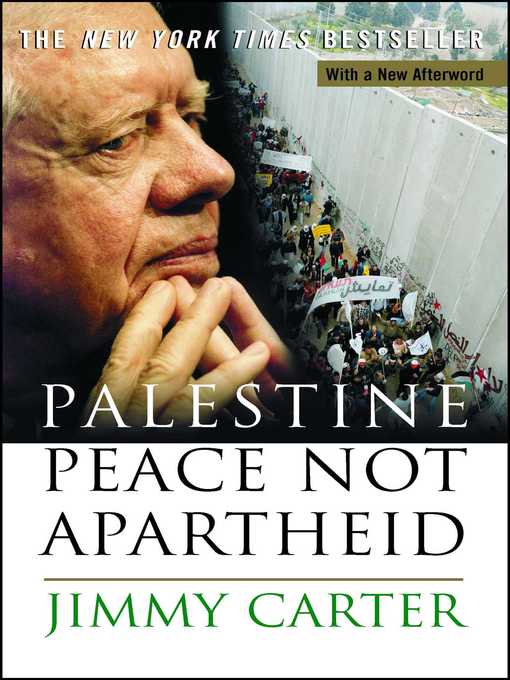
Palestine Peace Not Apartheid
کتاب های مرتبط
- اطلاعات
- نقد و بررسی
- دیدگاه کاربران
نقد و بررسی

October 30, 2006
The term "good-faith" is almost inappropriate when applied to the Israeli-Palestinian conflict, a bloody struggle interrupted every so often by negotiations that turn out to be anything but honest. Nonetheless, thirty years after his first trip to the Mideast, former President Jimmy Carter still has hope for a peaceful, comprehensive solution to the region's troubles, delivering this informed and readable chronicle as an offering to the cause. An engineer of the 1978 Camp David Accords and 2002 recipient of the Nobel Peace Prize, Carter would seem to be a perfect emissary in the Middle East, an impartial and uniting diplomatic force in a fractured land. Not entirely so. Throughout his work, Carter assigns ultimate blame to Israel, arguing that the country's leadership has routinely undermined the peace process through its obstinate, aggressive and illegal occupation of territories seized in 1967. He's decidedly less critical of Arab leaders, accepting their concern for the Palestinian cause at face value, and including their anti-Israel rhetoric as a matter of course, without much in the way of counter-argument. Carter's book provides a fine overview for those unfamiliar with the history of the conflict and lays out an internationally accepted blueprint for peace.

March 1, 2007
Adult/High School-This is not intended to be a scholarly work but rather a frank assessment of the current state of affairs in the Middle East by an experienced elder statesman. Maintaining that "there is a formula for peace with justice in this]portion of the world," ex-President Carter proceeds to argue his point with clarity and urgency. His perspective derives from his term as president, his successful brokering of peace between Egypt and Israel via the 1978 Camp David Accords, and his continued involvement with the Israeli/Palestinian issue in the 30 ensuing years. He includes necessary historical context, traces the role of the U.S. in each succeeding administration since he left office, and mentions vital roles played by Syria, Jordan, Lebanon, and Saudi Arabia. Carter points to the 1979 Israeli-Egyptian peace treaty as proof that "ancient enemies" can coexist and sees hope in the statistical majorities of both Israelis and Palestinians who desire a resolution to conflict, despite the words and actions of some of their political leaderswhom he labels the "obstacles to peace." Whether one is steeped in knowledge of the Middle East or new to the subject, this book is essential reading, for it stimulates precisely the kind of dialogue that Carter believes is necessary to prod all affected peoples beyond present roadblocks to a just and lasting peace."Dori DeSpain, Fairfax County Public Library, VA"
Copyright 2007 School Library Journal, LLC Used with permission.

November 27, 2006
The term "good-faith" is almost inappropriate when applied to the Israeli-Palestinian conflict, a bloody struggle interrupted every so often by negotiations that turn out to be anything but honest. Nonetheless, thirty years after his first trip to the Mideast, former President Jimmy Carter still has hope for a peaceful, comprehensive solution to the region's troubles, delivering this informed and readable chronicle as an offering to the cause. An engineer of the 1978 Camp David Accords and 2002 recipient of the Nobel Peace Prize, Carter would seem to be a perfect emissary in the Middle East, an impartial and uniting diplomatic force in a fractured land. Not entirely so. Throughout his work, Carter assigns ultimate blame to Israel, arguing that the country's leadership has routinely undermined the peace process through its obstinate, aggressive and illegal occupation of territories seized in 1967. He's decidedly less critical of Arab leaders, accepting their concern for the Palestinian cause at face value, and including their anti-Israel rhetoric as a matter of course, without much in the way of counter-argument. Carter's book provides a fine overview for those unfamiliar with the history of the conflict and lays out an internationally accepted blueprint for peace.
Copyright 2006 Library Journal, LLC Used with permission.

October 15, 2006
It is generally believed that history will judge Jimmy Carter a better ex-president than president, with his good works as an "ex" tipping the scales in that direction. His latest book derives from his personal experiences in both arenas: as chief executive of the nation and as founder of the Carter Foundation, his postpresidency organization dedicated to world peace. In essence, the reader is presented with a history of Arab-Israeli discord and the search for a successful resolution. He cites the lack of permanent peace in the Middle East as a "persistent threat to global peace" and posits that the stumbling blocks to a lasting cessation of armed conflict are to be found within two contexts: Israel's unwillingness to comply with international law and honor its previous peace commitments, and Arab nations' refusal to openly acknowledge Israel's right to live undisturbed. The former president's ideas are expressed with perfect clarity; his book, of course, represents a personal point of view, but one that is certainly grounded in both knowledge and wisdom. His outlook on the problem not only contributes to the literature of debate surrounding it but also, just as importantly, delivers a worthy game plan for clearing up the dilemma.(Reprinted with permission of Booklist, copyright 2006, American Library Association.)

























دیدگاه کاربران